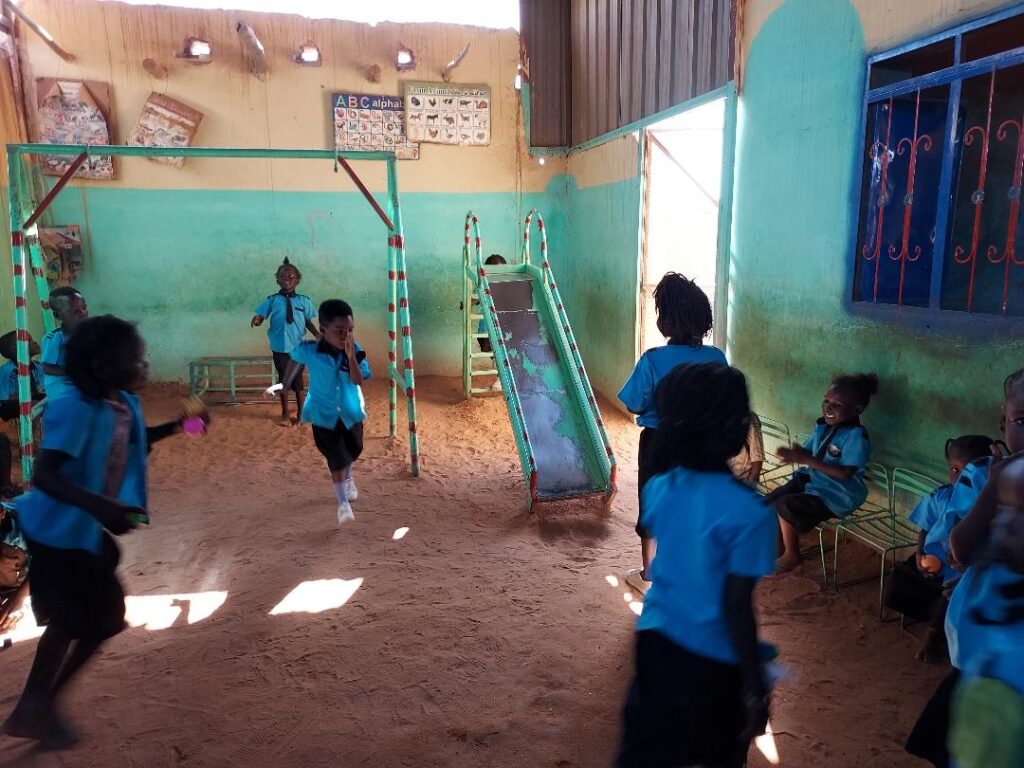
Salwa’s kleuteropvang
In een van de straatarme buitenwijken van Khartoem bevindt zich het kleuterschooltje van Salwa Abdelrahman. In 2009 is ze begonnen met de opvang van kleuters en peuters in de buurt. De kleintjes zwierven op straat omdat hun moeders, veelal alleenstaande dagloners, op pad waren om geld te verdienen voor hun onderhoud. Salwa bouwde een rieten afdak op de binnenplaats van het huis van haar moeder en begon daar haar opvang.
Ze runt nu alweer meer dan twaalf jaar haar kleuterklasje. Geld verdient ze met de verkoop van huishoudspullen en beddengoed, ingekocht bij de groothandel. Haar klanten zijn veelal vrouwen uit de buurt. “Vaak op afbetaling, want de meeste moeders verdienen niet genoeg om grotere bedragen in een keer uit te geven. Zo helpen we elkaar.”
Salwa heeft altijd gewerkt. Tijdens de basisschool verkocht ze pitten en pinda’s als snack aan schoolgenootjes. Haar studie aan de universiteit bekostigde ze met de verkoop van zelfversierde omslagdoeken. Daarna gebruikte ze het geld dat ze ermee verdiende om het familiehuis verder in te richten voor de opvang van de allerkleinsten in de buurt.
“De meeste kleintjes in de wijk zitten thuis of hangen op straat. Hun moeders werken als was- of poetsvrouw voor een dagloon en kunnen de kleuterscholen verderop niet betalen,” legde ze uit in 2011, toen ze de stichting benaderde met een verzoek om financiele steun.
Salwa is opgegroeid in de Nubabergen in wat nu het zuiden van Soedan is. Toen ze een jaar of vijf was, kreeg ze drie geitjes toegewezen om dagelijks te hoeden. Maar dat deed ze niet. In plaats daarvan liep ze haar oudere zusje achterna, die verderop, als enige van haar zes zussen, naar school ging. Haar moeder steunde haar en na maandenlang gesteggel met haar vader, gaf hij eindelijk toe en mocht ze ook naar school.
Halverwege de jaren negentig werd het oorlogsgeweld in de Nubabergen te hevig en vluchtte het gezin naar Khartoem. Nadat ze de middelbare school had afgerond, schreef Salwa zich in voor de studie ‘kantoormanagement’ aan de universiteit. “Ik begreep weinig van al die lijsten met wat je allemaal kan studeren,” vertelde ze toen lachend. “En niemand in m’n familie had er genoeg verstand van om me te helpen.”
Na haar studie vond ze geen werk en besloot ze vrijwilligerswerk te gaan doen. Veel vrouwen in haar wijk ver buiten het centrum van de stad zijn analfabeet. Salwa heeft ze niet alleen de beginselen van lezen en schrijven geleerd, maar ook laten zien hoe ze hun mobieltje moeten gebruiken. Velen raakten hun mobieltjes namelijk kwijt als ze aan een voorbijganger moesten vragen een telefoonnummer op te zoeken.
“We zijn door de jaren heen een hechte groep geworden, vijfentwintig vrouwen die elkaar door dik en dun steunen,” vertelt Salwa nu. “Als ze iets met de gemeente moeten regelen, komen ze meestal naar mij. Ik help ze graag.”
Ook als je haar vraagt naar haar dromen, blijft ze praktisch. “Het gaat nu economisch zo slecht met Soedan dat veel mensen het schoolgeld nauwelijks meer kunnen betalen. Ze sturen nu vaak een of twee van de oudste kinderen naar school. De rest blijft thuis of doet klusjes op de markt. Deze kinderen dreigen tussen de wal en het schip te vallen, want als ze ouder dan zeven jaar worden, nemen scholen ze niet meer aan. Ik zou dolgraag een klas voor ze openen om ze bij te spijkeren.”
Wat haar drijft? “Als ik naar de mensen in mijn omgeving kijk, dan zie ik mezelf weerspiegeld in hen. Toen ik klein was, hadden we het thuis goed. Het werd daarna minder, en in Khartoem weer minder. Ik heb het toch gered. Dan kan ik toch niet anders dan me inzetten om anderen te helpen zich ook te redden?” Door de torenhoge inflatie wordt het bedrag dat Salwa maandelijks van de stichting krijgt, steeds minder waard. Om deze reden hoopt de stichting, onder het motto ‘alle beetjes helpen’, meer maandelijkse of eenmalige donateurs te werven. Dus nieuwe donateurs die een (maandelijks) bedrag(je) kunnen missen, zijn meer dan welkom!
-
Nieuwsbrief mei 2024
Hongersnood Zoals beloofd hierbij een nieuwsbrief over de situatie in Omdurman, die, zoals door vele organisaties al voorspeld, van kwaad tot erger wordt. De mensen in de oorlogsgebieden in Soedan zijn door hun reserves heen terwijl de prijzen van weinige voedsel dat er is, de pan uit rijzen. Er zit weinig schot in vredesonderhandelingen en…
-
Nieuwsbrief februari-maart 2024
Van kwaad tot erger Jullie zullen vast wel af en toe een berichtje voorbij zien komen over ‘de vergeten oorlog’, zoals de meer dan tien maanden durende, gewelddadige strijd tussen het officiële leger, gedomineerd door islamisten, en de milities van de Rapid Support Forces (RSF) vaak wordt genoemd. Zoals veel VN-organisaties eind vorig jaar al…
-
Nieuwsbrief december 2023
Gevechten gaan door Dagelijks krijgen we berichten over extreem geweld in Gaza. Daardoor is Soedan op de achtergrond geraakt, maar dat betekent niet dat het geweld er geluwd is, integendeel. Even terug: Op 15 april breken er gevechten uit tussen het Soedanese leger en de Rapid Support Forces (RSF), een staatsmilitie, opgericht door de in…